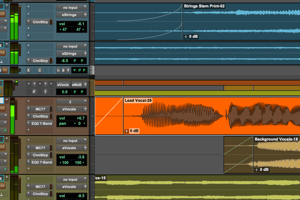Podcast
Questions and Answers
What is the purpose of evaluation questions in the context of review questions?
What is the purpose of evaluation questions in the context of review questions?
- To ask students to calculate areas of shapes
- To test students' ability to evaluate arguments, evidence, and solutions (correct)
- To encourage students to memorize information
- To focus on analyzing and interpreting multiple sources
Why is it important for review questions to be diverse?
Why is it important for review questions to be diverse?
- To make the questions simpler for students
- To make students confused about the material
- To challenge students with varying question types (correct)
- To focus only on open-ended questions
How can educators promote active learning through review questions?
How can educators promote active learning through review questions?
- By avoiding questions in the lesson
- By making all questions multiple choice
- By providing no feedback on student responses
- By integrating questions throughout the lesson (correct)
What is the significance of scaffolding questions in review?
What is the significance of scaffolding questions in review?
How can educators tailor review questions to meet diverse learners' needs?
How can educators tailor review questions to meet diverse learners' needs?
Flashcards are hidden until you start studying
Study Notes
Revisiting Learning: Exploring Lesson Review Questions
Lesson review questions play a vital role in ensuring that students not only grasp the content but also retain it for the long term. These questions serve to assess understanding, promote critical thinking, and facilitate a deeper engagement with the subject matter. In this article, we'll delve into this essential educational tool, discussing the benefits, crafting effective strategies, and the importance of well-structured review questions.
The Benefits of Review Questions
Review questions help students retain information by requiring them to:
- Reflect on what they've learned
- Recall key concepts, principles, and facts
- Think critically about the material
- Identify gaps in their understanding
- Prepare for assessments
Types of Review Questions
- Recall questions: These test students' ability to remember specific facts and details. For example, "What is the capital of France?"
- Understanding questions: These check students' comprehension of a concept, often requiring them to explain or apply their knowledge to a new situation. For instance, "Explain the difference between an empirical and a theoretical approach in science."
- Application questions: These assess students' ability to apply their knowledge in a practical context. Examples include "Calculate the area of a rectangle with dimensions 5 cm x 10 cm" or "Explain how you would use the scientific method to test a hypothesis about the effect of exercise onstudents' test scores."
- Analysis and synthesis questions: These require students to analyze, interpret, and connect information from multiple sources. For example, "Compare and contrast the economic policies of the United States and China" or "Explain how the human body's immune system works in response to an infection."
- Evaluation questions: These test students' ability to evaluate arguments, evidence, and solutions. For instance, "Critically analyze the effectiveness of the United States' response to the COVID-19 pandemic" or "Evaluate the role of genetics in determining an individual's intelligence."
Crafting Effective Review Questions
- Be specific: Focus questions on the key topics and concepts covered in a lesson.
- Be clear: Avoid overly complex or ambiguous language.
- Be challenging: Pose questions that require students to think critically and apply their knowledge.
- Be diverse: Include a variety of question types, such as open-ended, multiple choice, and short-answer questions.
- Be relevant: Tie questions back to the learning objectives and assess students' understanding of the material.
Best Practices for Implementing Review Questions
- Scaffold questions: Sequentially present questions that build on each other, allowing students to gradually deepen their understanding of the material.
- Integrate questions into lessons: Incorporate questions throughout the lesson, rather than only at the end. This approach promotes active learning and encourages students to stay engaged with the material.
- Differentiate questions: Tailor questions to meet the needs of diverse learners, such as providing additional support or accommodations for students with special needs or English language learners.
- Use a variety of formats: Incorporate different question formats, such as multiple choice, short-answer, and open-ended responses, to engage students and assess their understanding of the material in various ways.
- Provide feedback: Provide students with constructive feedback on their responses to help them improve their understanding of the material.
Final Thoughts
Review questions are a powerful tool that can help students retain information and develop their critical thinking skills. By crafting effective questions and integrating them into lessons, educators can promote active learning, deepen students' understanding of the material, and prepare them for assessments. Remember, the key to crafting effective review questions is to be specific, clear, challenging, diverse, relevant, and to integrate them into lessons in a scaffolded manner that meets the needs of diverse learners.
Studying That Suits You
Use AI to generate personalized quizzes and flashcards to suit your learning preferences.




